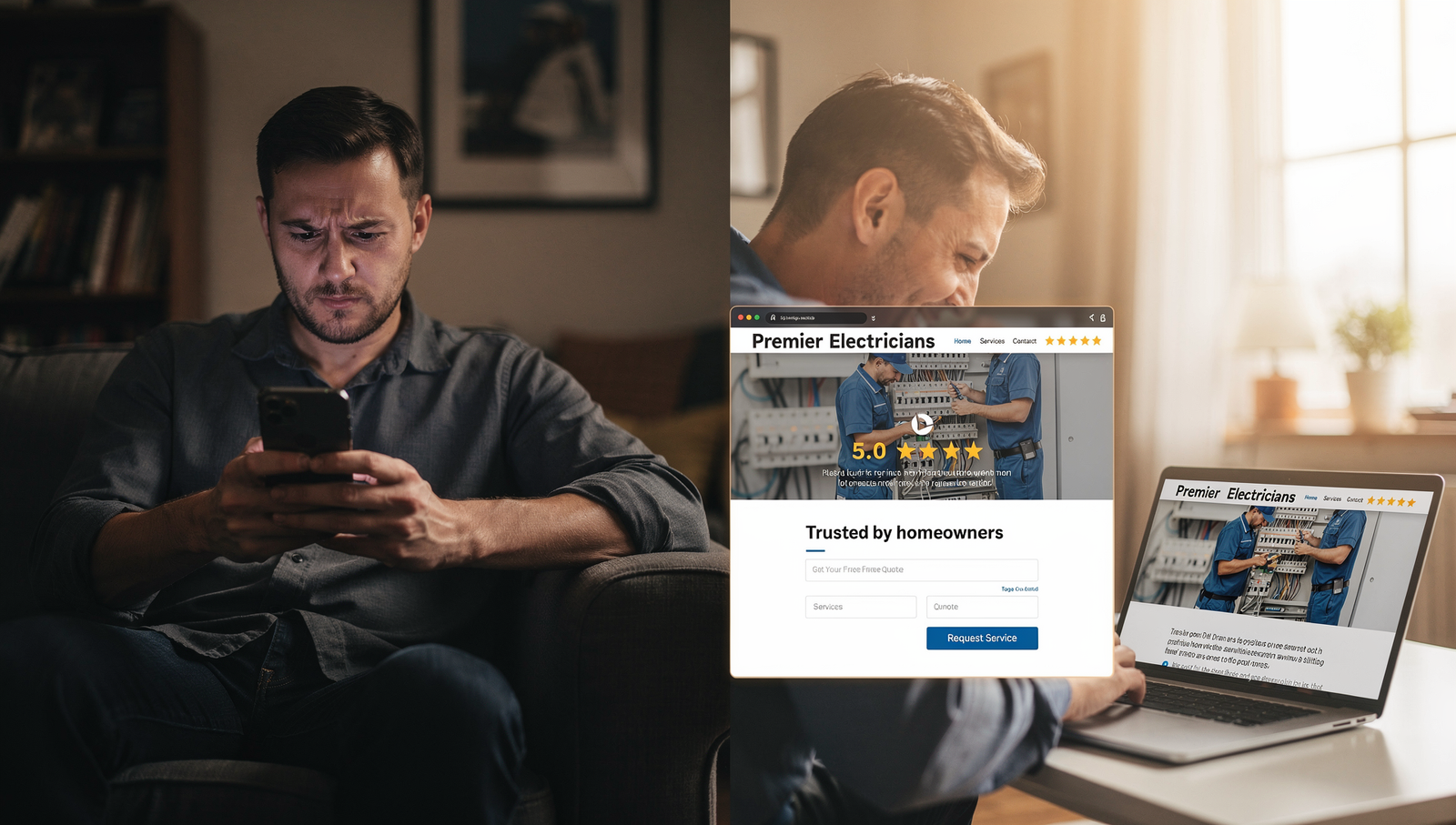6 Comps Pricing Errors That Kill Deals Fast
Most pricing mistakes happen before the listing ever goes live. This shows how to use comps like a pro.

Want More Clients Fast?
Steal This Website Rescue Kit to Get More Clients, More Calls, and More Sales on Autopilot
Pricing a home correctly is one of the most critical steps in real estate. If you overprice, the property can sit on the market and go stale. If you underprice, your client leaves money on the table. Learning how to price real estate property with comps (comparable homes in the area) is the proven way to hit that sweet spot where buyers are motivated and sellers are satisfied.
In this guide, we’ll break down the process step by step so you can walk into every listing presentation with confidence, armed with both data and strategy.
How to Price Real Estate Property with Comps: The Basics
Comps are recently sold homes in the same area that are similar in size, features, and condition to the property you’re pricing. They provide a snapshot of the current market and show what buyers are willing to pay right now.
When pulling comps, look for:
Homes sold within the last 3–6 months
Properties within a one-mile radius (or neighborhood boundaries)
Similar square footage (within 10–15 percent difference)
Comparable features (bed/bath count, garage, lot size, upgrades)
This is the foundation of a solid comparative market analysis (CMA)…a skill every successful realtor must master.
Why Getting the Price Right Matters
According to the National Association of Realtors, 22 percent of homes require a price reduction before selling. This not only costs your client time but can hurt your reputation if sellers feel their home was mispriced.
By relying on comps, you can:
Build trust with sellers through data-driven recommendations
Reduce time on market
Increase the likelihood of multiple offers
Position yourself as the obvious choice over agents who rely on guesswork
If you want to boost your credibility even further, tie your comps strategy into the digital side of your business. Tools we cover in our post on the Best Free Tools for Realtors can help you streamline research and present data in a polished way.
Step 1: Gather the Right Comparable Homes
Not all comps are created equal. A four-bedroom home with a pool isn’t a good comp for a two-bedroom condo across town.
When pulling comps, focus on:
Location – Homes in the same subdivision or school district carry more weight than those just outside.
Size – Keep square footage within 15 percent up or down.
Features – Fireplaces, basements, updated kitchens, and pools all affect price.
Sale Type – Avoid foreclosures or distressed sales unless your listing is in that category.
Tip: Showcase IDX and other MLS integrations (explained in our post on What Is IDX and Why It’s Crucial for Modern Agents) make it easier to access accurate comps in real time.
Step 2: Adjust for Differences
Even the best comps aren’t identical. This is where you make adjustments.
For example:
If a comp has a remodeled kitchen worth $20,000 more than your listing, adjust downward.
If your property has an extra bedroom, add value compared to a smaller comp.
This isn’t an exact science, but using local market knowledge plus appraisal guidelines helps keep things consistent. Tools like spreadsheets or CRMs (see our post on the Top 5 Best CRMs for Realtors) can help you organize adjustments in a professional way.
Step 3: Spot Market Trends
A CMA isn’t just about recent sales…it’s about what’s happening right now. Look at:
Active listings (your competition)
Pending sales (where demand is heading)
Days on market (how quickly homes sell)
If the average home sells in 10 days but your comps sat for 60, it’s a clear sign that price was the issue. This market insight helps sellers understand pricing urgency.
For more on how to position yourself as the expert, check out our post on How Realtors Can Dominate Google with Local SEO. Being visible online helps back up the authority you bring to the pricing conversation.

Step 4: Use Technology to Present Your Case
A CMA is only as good as how you present it. Imagine showing a seller three pages of numbers versus a sleek, interactive presentation. Which builds more trust?
Tools like digital CMAs, interactive charts, and even branded websites can make your data look professional and persuasive. At Digital Dream Homes, we build luxury websites that include features like market analysis pages to support your sales pitch.
Want to elevate your presentations? Our post on Real Estate Website Conversion Tips explains how the right design can turn casual visitors into warm leads.
Step 5: Manage Seller Expectations
Even with strong comps, some sellers will insist their home is worth more. This is where your role as a trusted advisor shines.
Here’s how to handle it:
Show data visually (charts, graphs, timelines).
Explain buyer psychology…overpriced homes deter showings.
Share case studies of past clients who priced correctly and sold quickly.
If sellers still resist, suggest listing at their price but with a 2–3 week review period. This compromise helps protect your reputation while giving them time to see the market response.
Need help crafting your seller messaging? Our post on How to Attract High-End Sellers Online walks you through strategies that work.
Real-World Example: The $15K Lesson
One of our realtor clients recently priced a property using comps but agreed to go $15,000 over the recommended range to please the seller. The home sat on the market for six weeks with no offers. After adjusting back to the CMA’s suggested price, it sold in three days with multiple bids.
This experience reinforced the value of sticking to comps and showing sellers that the market…not emotion…determines the price.
For even more ways to avoid costly mistakes, read our post on Top 7 SEO Mistakes Realtors Make and How to Fix Them. While it focuses on digital marketing, the principle is the same: accurate data beats guesswork.
Bringing It All Together
Learning how to price real estate property with comps is more than just running numbers. It’s about combining data, technology, and presentation to position yourself as the go-to expert in your market.
When you price strategically:
Sellers trust your guidance
Buyers see value
Deals close faster
At Digital Dream Homes, we don’t just build websites…we help you win more listings and convert more leads. If you want a site that showcases your expertise with tools like CMAs, IDX integration, and lead capture, book a free consultation with us today.
Matt Pieczarka
Want a Free Website Audit?
Fill out your information below and we will send you a personal screen share video of tips on how to make your actual website better!
See How Many Closings You're Losing to Zillow!
Click Here to Use our Calculator to See How Many Clients Zillow is Taking From You Per Year!
Some More Posts About Strategy and Growth…
- Marketing Plan For Small Business 2026 Every Owner Should Copy
- Benefits of Professional Website for Small Business: The Hidden Profits
- How to Get More Referrals for Small Local Business Fast
- Customer Retention Strategies Small Business Owners Never Hear About
- How Small Businesses Compete Online And Actually Win In 2026
- Blogging for Small Business Growth: 2026 Profit Multiplier
- Sales Funnel For Small Business Website That Prints Money
- What Is A Listicle And Why Your Website Desperately Needs One
- Strategic Website Design That Turns Small Business Clicks Into Clients
- The Simple Blueprint to Explosive Small Business Growth
9 Functional Medicine Website Designer Tips to Grow Faster
9 Functional Medicine Website Designer Tips to Grow Faster Watch the video to learn one psychological SEO trick to build more trust and get more leads from your website! Wan
7 Functional Medicine Website Design Moves That Get Patients
7 Functional Medicine Website Design Moves That Get Patients Watch the video to learn about the best layout to get more leads and patients guaranteed! Want More Clients Fast
11 Electrician Website Designers That Turn Clicks Into Calls
11 Electrician Website Designers That Turn Clicks Into Calls Watch the video to learn the best layout for best results! https://youtu.be/XaEbNPZxi0U?si=kT1Cru8S2SMJSPNx Want More C
11 Electrician Website Help Fixes That Turn Clicks Into Calls
11 Electrician Website Help Fixes That Turn Clicks Into Calls Watch the video to learn how to structure your website for the best return on investment! https://youtu.be/XaEbNPZxi0U
11 Electrician Web Design Company Questions to Ask
11 Electrician Web Design Company Questions to Ask Watch the video to learn the best website layout for the most lead conversions! https://youtu.be/XaEbNPZxi0U?si=SgxjOWdd7F6f4Mtg
13 Electrician Website Templates That Turn Clicks Into Paid Jobs
13 Electrician Website Templates That Turn Clicks Into Paid Jobs Watch the video to learn the best template layout for the best results! https://youtu.be/XaEbNPZxi0U?si=rGg1WlUWlmH
11 Electrician Website Services That Bring In More Calls
11 Electrician Website Services That Bring In More Calls Watch the video to learn the best website layout for the best results https://youtu.be/XaEbNPZxi0U?si=rGg1WlUWlmHTg73v Want
12 Electrician Website Upgrades That Win More Jobs
12 Electrician Website Upgrades That Win More Jobs Watch the video to learn the best website layout to get the most bang for your buck! https://youtu.be/XaEbNPZxi0U?si=uFqsnSFvenQ1
5 Electrician Website Design Company Upgrades That Win Jobs
5 Electrician Website Design Company Upgrades That Win Jobs Electrician website design that earns trust fast and drives more calls. See the must-have upgrades and book more jobs. h









